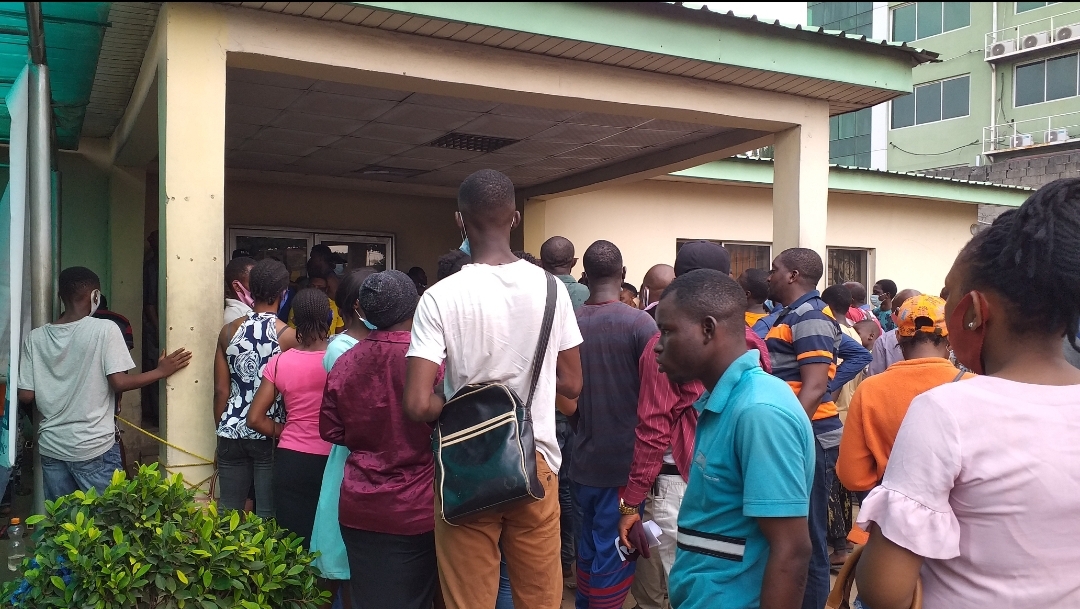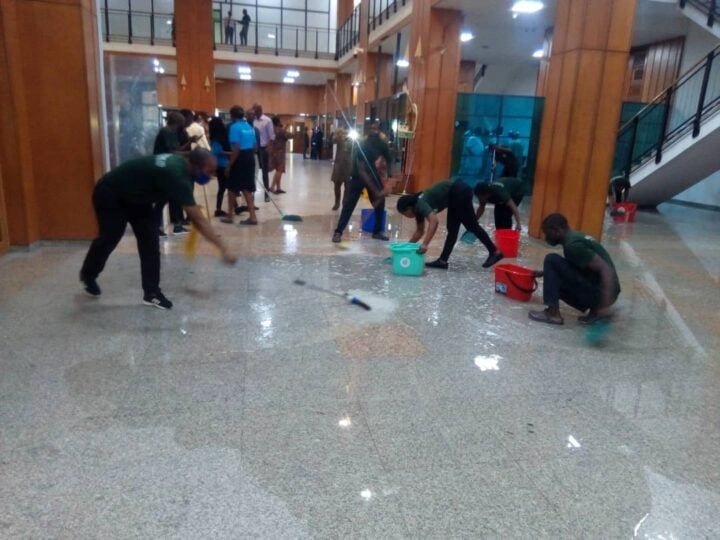Being a novel virus, the arrival of COVID-19 in Nigeria on February 27, 2020, elicited mixed reactions. For some, the infection was more or less as potent as malaria which can be treated with the use of over-the-counter drugs. For others, it was a deadly infection; hence the need for precautionary steps to guard against it.
There was widely-circulated misinformation concerning the infection. Myths were circulated on social media platforms and instant messengers. Among the myths circulated include a claim that the hot weather in the country suppresses the virus. Also, some said the infection was not an ”African disease” because of the higher number of cases and casualties recorded in Western countries. According to the circulated claim, the hot temperature in Africa worked against COVID-19 by limiting its spread, but other countries with cold temperature are more susceptible.
In a vox pop by LegitNG, some respondents said they were not afraid of the virus because they believed it had a very low chance of survival in the country’s hot weather. Others said they relied on herbal concoctions to fight the infection.
COVID-19: THE MISCONCEPTION ABOUT HOT WEATHER
Advertisement

In a research study conducted by NOI Polls in March 2020, the results showed that 26 percent of Nigerians believed they were immune to COVID-19. While 40 percent said it was because they are ‘children of God’, 30 percent ascribed their immunity to strong genes. The country’s weather, 17 percent said, is too hot for COVID-19 to survive, while 8 percent said the strong herbs they drink could deal with the virus and 5 percent were of the opinion that it was a foreign disease.
Adeola Fowotade, a clinical virologist at the College of Medicine, University of Ibadan, also claimed the hot weather in the country could suppress COVID-19, adding that the infection was most prevalent in temperate climates during winter.
Advertisement
“That is an extrapolation from what happened with influenza virus also known as the flu, which is most prevalent in colder climate during winter. We believe that if COVID-19 is a Respiratory Tract Infection, probably it will follow the same pattern,” Fowotade said.
“There is a very high chance there will be some remission as temperature gets warmer in those temperate places. But for us with tropical climate, we believe that this outbreak might not go on for too long and might abate very soon.
“This is because the droplets generated by the virus cannot travel far and this virus is an envelope virus. Envelop viruses are very susceptible and cannot survive very long in hot climate.”
Jeremy Brown, a public health expert with George Washington University, noted that warmer weather may curb the spread of the infection. Corroborating this, the U.S. Department of Homeland Security, under the administration of former President Donald Trump, issued a report that hot temperatures could slow down COVID-19 spread.
Advertisement
However, other academic studies have dispelled the claim that hot weather has a role to play in checking the spread of the infection. Researchers at the University of Texas revealed that the impact of weather on the virus is insignificant.
“The effect of weather is low and other features such as mobility have more impact than weather. In terms of relative importance, weather is one of the last parameters,” Dev Niyogi, professor and lead researcher at the University of Texas, said.
For Kano, one of the states with hot temperature in Nigeria, the infection claimed many lives. In April, 979 residents died in eight municipalities of the state with 43 deaths recorded daily. Osagie Ehanire, minister of health, said more than 50 percent of the strange deaths in Kano were due to COVID-19.
Some countries with hot weather, like India, are currently battling severe cases of the coronavirus infection. In March, climate scientists including the India Meteorological Department predicted that the country would experience hotter weather and intense heatwave during most parts of the year. Yet, the hot temperature has not kept the country’s rising COVID-19 infections on the low as the virus keeps mutating.
Advertisement
In April, India recorded more than 300,000 cases of COVID-19 — the highest single-day tally in the world. A month later, the Asian country recorded 401,229 new coronavirus infections in one day — with a single-day fatality count of 4,191 deaths.
Currently, India is the second country in the world with the highest rate of coronavirus infections — with about 29 million infected and 349,229 dead.
Advertisement
VERIFYING THE CLAIM
Despite the divergent claims, renowned global and local health organisations have said weather has no prominent role in suppressing the virus.
Advertisement
The World Health Organisation (WHO) said though temperature and humidity may influence how long the virus survives outside the human body, it has no influence in slowing down the spread.
“No. There is currently no conclusive evidence that either weather (short term variations in meteorological conditions) or climate (long-term averages) have a strong influence on transmission. The SARS-CoV-2 virus which causes COVID-19 disease has been transmitted in all regions of the world, from cold and dry, to hot and humid climates,” WHO said in reaction to the widespread misinformation.
Advertisement
In May 2020, Nigeria’s presidential task force (PTF) on COVID-19 said the claim about the role of weather as regards the infection has no scientific backing. As of that time, Nigeria had recorded thousands of COVID-19 infections and fatalities, including the death of prominent figures like Abba Kyari, chief of staff to the president; Abiola Ajimobi, former governor of Oyo state; Buruji Kashamu, former senator from Ogun state; Suleiman Achimugu, former managing director of the Pipelines and Products Marketing Company (PPMC), a subsidiary of the Nigerian National Petroleum Corporation (NNPC), and Wahab Adegbenro, then commissioner of health in Ondo state.
“The first one has to do with climate: Hot climate prevents the spread of COVID-19. No matter how sunny or humid the weather is, anybody can get COVID-19. Nigeria has recorded a total of almost 5,000 cases to date irrespective of the fact that we are actually a hot country,” Sani Aliyu, the PTF national coordinator, said.
“There is also no scientific evidence to show that coronavirus cannot survive hot weather. The best way to protect ourselves against COVID-19 is maintaining physical distancing, washing our hands, use of face masks, etc.”
The Nigeria Centre for Disease Control (NCDC) had said based on available evidence, “the virus causing COVID-19 can be transmitted in ALL AREAS, including areas with hot and humid weather”.
THE BREACH OF COVID PROTOCOL AND SECOND WAVE OF INFECTIONS

Despite the set of guidelines published by the federal government to contain the spread of the infections and its devastating effects on the population, Nigerians continued to flout the directives.
Passengers were packed in public buses; markets were crowded with no recourse to social distancing. Worshipers trooped to religious centres en masse without face masks. Some travellers who came into the country from nations with high infection rates disregarded self-isolation. Social events were held with many people in attendance and huge crowds were also present at political events.
The negligence and disregard for safety precautions contributed to the second wave of COVID-19 spread in Nigeria.
By December 2020, the presidential task force said Nigeria was experiencing a second wave of infections. Two weeks later, Nigeria recorded six deaths within 24 hours — owing to complications from the infection. In January, more deaths were recorded. Official data indicate that one in five persons tested for COVID-19 in the country turned positive.
As of June 17, the country recorded 167,103 infections — with 163,528 discharged patients and 2,117 deaths. The daily infection figure has, however, dropped significantly as the country keeps vaccinating its citizens against the disease. According to the National Primary Health Care Development Agency (NPHCDA), 1,981,091 people have taken the AstraZeneca COVID-19 vaccine as of June 16.
This report was produced as part of the Africa Resilience Network (ARN) programme with support from the Institute for War and Peace Reporting (IWPR), in partnership with the Centre for Information Resilience (CIR), the International Centre for Investigative Reporting (ICIR) and Africa Uncensored.
Add a comment







